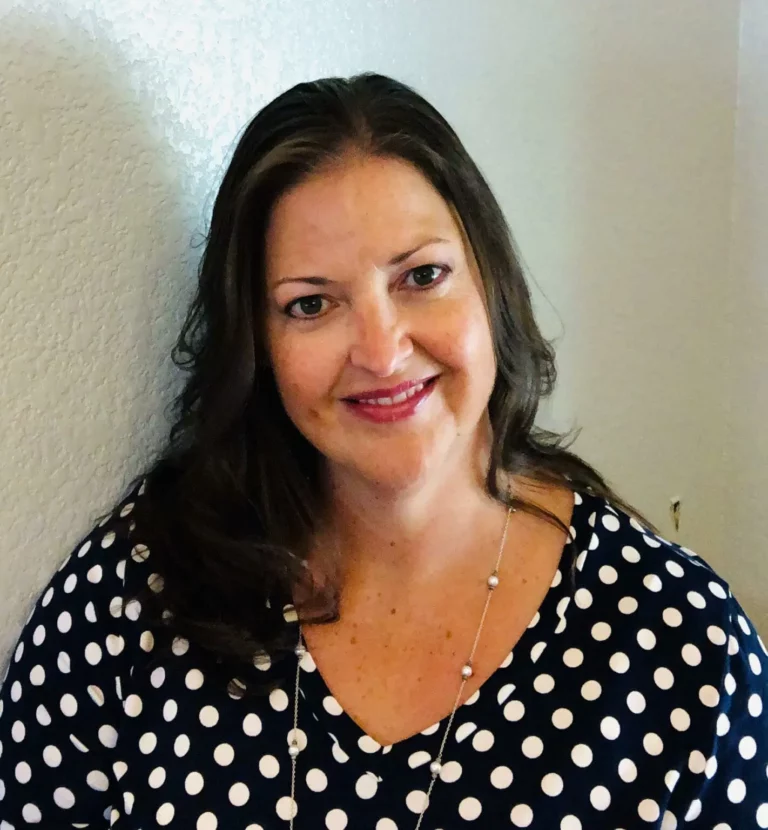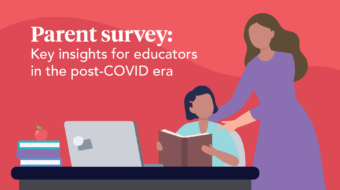
Introduction
I grew up in Colorado near where I live now. My parents actually live in the same house they bought when I was four! I have three children, two biological children and a stepchild. They are all in their early 30s. I have four grandchildren. I left Colorado for a short period of time and went to college at Anderson University in Indiana. I came back to Colorado and did my graduate work at the University of Northern Colorado.
Prior to working as a school psychologist, I worked in law enforcement and probation. I worked in juvenile probation and was a victim advocate for a local police agency. I worked with high risk family and youth for around 11 or 12 years. Recently, a friend mentioned something to me about how they had a career sandwich. I kind of did that too! I had one career and then I had another and now I’m pushing it all together. I never thought I’d leave a school setting. I didn’t really know what else there was out there.
I’ve also spent time teaching in a community college setting. I started my college career in a community college as a young mom and a single parent, and always wanted to give back. I had the most incredible mentors in that setting—powerful, strong women and several advocates for women in science.
I’ve worked in a full time school setting for almost 16 years, and always loved being involved with the kids. But as time went by, I was looking for something else and was ready to leave the political hotbed that I believe is in a school building. I stretched out of my comfort zone—to look around. I was asked to be on a podcast a couple years ago and I participated in that. Listening to the stories of other women working all over the country in every field imaginable was a wonderful experience—I spent time listening and hearing about women in all sorts of career environments that maybe never anticipated being there, which was kind of me. There are still many days when I wonder what I’ll do when I actually grow up!
My husband and I love to travel. I do a lot of paper crafting and memory keeping. I truly love to spend time in the mountains, and we take as many opportunities to get to the ocean as we can. Travel is centered around family and to just enjoy being together as much as possible. My parents are still alive. And I have one living grandfather. So our goal is to spend as much time as possible together.
What inspired you to become a school psychologist?
As I mentioned, I had worked with high risk family and youth for a pretty long time, both working on the front end in law enforcement and on the back end, in probation and corrections. And I noticed a lot of parallel themes with both victims and offenders. Because I did work so much with kids, I felt the reactive system, and disliked it! I was looking for a proactive system—and found it in School Psychology. One day I went to a school to do a horrible, horrible death notification—I had to gather some little children whose grandfather had accidentally backed over their sister. It was terrible. The school was in a big neighborhood built around it, and word of those things travels very quickly.
I went into the school and explained who I was—that I was a Victim’s Advocate who worked at the police department, and I needed to gather these little kids as quickly as possible. And they responded, saying they were going to have me work with the school psychologist. And I am thinking to myself, what’s a school psychologist? I really had no idea. And so then as I started talking with her, we both became more acquainted with the field, and I just thought it was a very fascinating career path within the field of Psychology.
As I was talking with her about what she did, I started thinking back to my younger brother who is dyslexic to the level that he can’t read an analog clock, but he has a genius IQ. He’s a very intelligent man with a high level job in technology today. And I started thinking about what a School Psychologist is, and when I would have heard those words before, but couldn’t place it. I realized the words were familiar because my brother was on an IEP—but I didn’t really know what an IEP was so I spoke to my mom and asked her to tell me about it. She told me she still had his IEP, that it’s a six-page carbon copy document, all handwritten, which I thought was fascinating. And she asked me, “Don’t you remember the doctor at your school?” And I responded that yes, I did, and she said “He was a School Psychologist.
So it was a weird confluence of events where I had this experience in my work life, and then I connected it at home. And I realized that this might be something I’d like to do, so I pursued it.
What made you want to be a teletherapist with PL?
I was interested in serving students and schools differently. I’d spent 15 years in a traditional brick and mortar School Psych and Administrator role, and needed something new. PresenceLearning’s mission and vision was very interesting to me! I think when we were in the throes of COVID, I started thinking more seriously about a change. I had been considering it for about two years—I had been asked to take on this role of Assistant Principal and it just wasn’t hitting my marks. I never went home with a full bucket.
I had a friend who had done teletherapy in Alaska because they didn’t have enough professionals. So I had an inkling about it, but I knew very little and started doing some research. I think all of the weird things that were being discussed in schools just pushed me out…the whole idea of trying to keep elementary school children six-feet away from each other, and how they couldn’t even eat in a group setting seemed overwhelming. It made sense, but I couldn’t wrap my head around doing it, alongside not feeling like I had a full bucket.
I started looking around, and I looked at a lot of different companies. Then I watched the<strong> PresenceLearning [Provider Community] video </strong>(see inset), which spoke to me about truly serving students in a way that you weren’t losing the service with all the other stuff. I took away the idea of providing good quality care, and having that be the focus away from some of the other things that I felt were a distraction, and doing it well. It was SLPs, mental health folks, OTs—it just felt like this wonderful continuum of services with a focus on quality, focus on the child, and providing districts with what they need. Something about that video just really got my attention. And I spoke to my husband specifically about it, telling him this company really interests me, it’s more than a job. It’s definitely a way of getting everybody what they need—it gets districts what they need and kids what they need. And as a provider, you can feel really good about the work that you’re doing. So often, I think providers are overworked and overwhelmed and stretched really thin.
I’m super busy for sure. And I love the work. But I no longer have that stress. And somehow PL’s video gave me an insight into that. So that’s how I landed with PL. It wasn’t just a vibe, it was what was said. It was the confluence of believing everybody’s important in this relationship. That benefits children the most.
Could you walk us through your daily routine? A “day in the life of a PL therapist” if you will?
I now work out everyday! That is a first for me, but I have so much more time than before. I check email, review upcoming assessments and meetings. I sort paperwork by those categories and then do a review of paperwork to determine what input I need from other stakeholders, followed by assessments, meetings or report writing as needed. It is different everyday, however, I feel like I get more done working in teletherapy than I used to working in a school setting. I also have more time for my family, and I feel so much less stress!
It’s a huge change for me to feel that I also have the time to get up, exercise, go to my calendar, go to my email, take a look at everything that’s there, and plan for my day. Sometimes that means coming down into my space and doing some paperwork—managing the minutiae of the job that you do almost anywhere—but I don’t have that crazy rushed feeling. I actually plan with intention what’s going to happen.
A lot of the time, I use early morning to get ready for the day. Once I shut down for the day, I check my email one more time via my phone, just to make sure something crazy didn’t happen. I feel fortunate I can put it all away and come back tomorrow. I feel like that has made me a much more peaceful, successful individual. What I do has some real clear parameters. I was a little bit worried about that, because I can be a bit of a workaholic. But setting work aside and moving on with my family life has been wonderful. It’s a GREAT schedule for a provider.
And it’s just little things like being able to run to a dentist appointment. I don’t feel guilty that I’m leaving the building or sorry I can’t meet with someone today. I have so much more control over my schedule. But I also feel like I give such better service—and that’s huge.
What age range/student population are you currently serving? Please include demographic information.
I have been working with students in K-12 in three districts—so I’ve had them all. I work with all colors, ages, ranges—all walks of life. The two schools in Washington were quite similar to each other, in that both were in small, rural towns. My California kids were in a very large urban district. It gave me an opportunity to spend time better understanding California law around assessing students. California definitely has some unique laws around assessment and disability categories. Making the decision to cross-license helped expand my knowledge.
What do you enjoy about being a provider with PL?
I enjoy the flexibility of working with students without the confines of being in one building. I enjoy the personal growth that comes from changing the ‘typical school psych paradigm’ and learning new things by working in different states and viewing educational services in a totally different way!
In Colorado, the typical School Psych paradigm is lots of schools on your caseload—try to see them all, each week. Then, lots of kids that you would like to dive deeper with but, you just can’t. So for me, the paradigm was seeing kids all day, writing reports in the evenings, being hopeful that you made sure that you connected this mental health provider, or that mental health group, or that social worker. Juggling all the balls, hoping they all stay in the air! It’s wonderful to not feel that pressure. I no longer feel like I don’t have time in my day to make a relationship with a student.
And the same is true with my districts. Initially, I wondered what that would be like. One of the things you do your first week of work in a district is to go to each building and introduce yourself, and get to know the secretary and the principal, and they introduce you to all these people. I didn’t know how it was going to work. But—it works! I don’t know how else to say it other than it just really reduced a lot of the super stressful negativity for me.
What were you most surprised about when you made the transition to be a teletherapist?
I noticed a renewed vision associated with an increased focus on students and their needs, as well as increased job satisfaction. I have so much less daily stress! I love being able to workout everyday, and manage my time when I have cancellations. I love feeling on top of my work. I totally love the platform, and assessing students in this way. I also love not having to chase test kits and look for mental health resources, which are all part of our platform. I love PL!
What challenges have you encountered during the transition to teletherapy, and how have you worked to overcome them?
The challenges were associated with setting up my own structures and procedures. To overcome them, I made changes as often as needed, while embracing the growth required by doing something new. I read books about being my own boss. I just had to really focus on systems and figuring out what worked for me. I have never looked back and love what I do!
How has the PL online platform enabled you to help your students and the schools you serve in new ways?
I no longer chase test kits. Everything I need is right there and I think students are naturally more engaged with online assessments.
I love the platform. It’s very functional for me. I still print things here and there just because that fits in my organizational framework. And I have made some changes. Initially, I bought a daytimer/planner. I stopped using it after a month—I have gone (mostly) electronic!
I was dreading the first workshop because I wasn’t super familiar with online learning. In the community college setting, I taught in person. I didn’t teach online classes—on purpose! So I wasn’t looking forward to the initial Telepractice Institute. I wasn’t sure how effective it would be for me to just read a screen. But it wasn’t like that at all. And it went really quickly. I enjoyed the time that I spent on it. What PL did for me—in that way—was significant. And even now, as I have questions, somebody will get on with me for a help chat. And they’ll attach an article which is good because I can reference it later. So I do really love the platform and having the support piece within it as well.
I think our support team is really, really extraordinary. It’s immediate—literally the longest I’ve ever really waited for somebody to respond can’t be more than a minute or two. I think that makes a lot of difference, especially as I have listened to podcasts and programs about being an Independent Contractor—which I never thought I really wanted to be. But I thought that was the direction I was going to have to go, if I was going to work for myself. The magnitude of difference working as a PL Contractor is substantial.
Can you tell us a little about how you collaborate with teachers and other school staff members?
I collaborate via meetings and emails. I also use questionnaires as part of student evaluations. I am part of the Response to Intervention (RtI) process in both of my districts. I make myself available for additional virtual meetings when asked, as I am part of their team!
Teachers complete the same questionnaires that we used in a direct service model. They’re published by the companies that help psychologists look at mostly social, emotional, behavioral, and sometimes executive function work. So those questionnaires come through a membership platform that school psychologists typically pay for and manage on their own.
How do you build trust and rapport with parents?
I communicate with parents as part of student evaluations. I also engage parents during meetings and offer additional communication if/when they have questions. I offer flexibility for IEP meetings and question/answer meetings as needed.
What tips do you have for other providers getting started with telepractice?
Do your due diligence to figure out how you can be successful as a provider and as a contractor. Ask yourself, What do I need to have ready and available? You have to be fully invested in your own success. I think the biggest thing is to manage the action. I believe action promotes motivation. I think you’ve got to manage a lot of action to create the motivation to get the ball rolling, to know what your next steps are. Maybe that’s just me, because I had never thought of working for myself and believed I would shy away from it. But it’s rewarding to walk away from the paradigm that you have really boxed yourself into. You’ve got to do the work on the back end—you need to do some research to figure it out. I always felt like those who had their own business were so brave, so much smarter than me. It’s because I just never spent the time thinking about it!
As a psychologist, you know that if you don’t take care of yourself, your efficacy goes down, right? I’m not sure I realized just how much I was not taking care of myself. I was a building leader for almost eight years and at the end, I was just frazzled. It makes me sad to realize that.
What advice would you give districts considering online therapy?
I would highly encourage online therapy as it provides quality services and professionals who deeply care about students. Online therapy is a way to bridge the gap when you have a shortage of professionals or long-term absence.
Are you interested in joining the PresenceLearning Care Network? Click here to start your application.
NOTE: Theresa Boen was a PresenceLearning Care Network provider from fall, 2020 to May, 2021. Theresa is now a clinical account manager at PresenceLearning. This interview was conducted before she took on that role with PresenceLearning.



